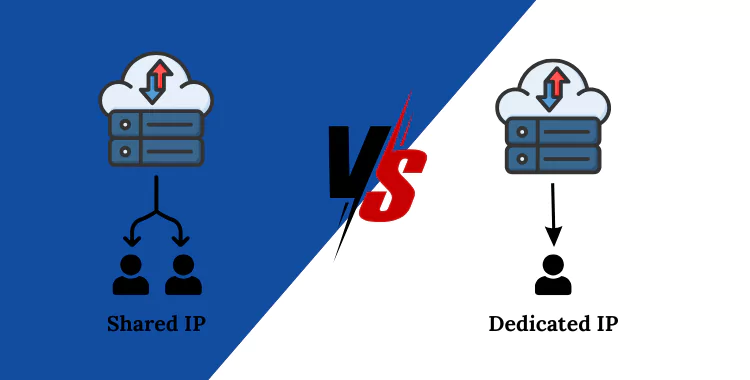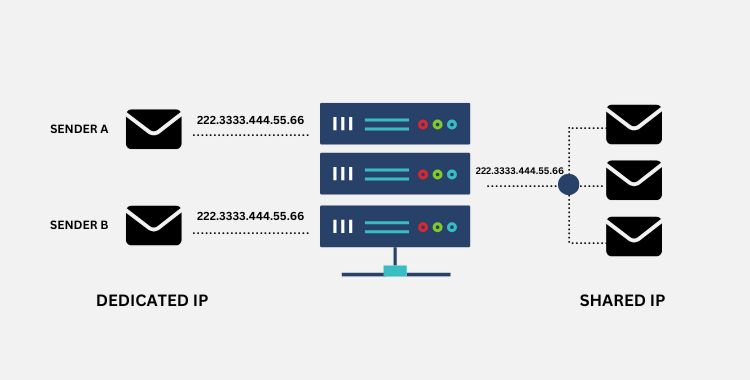Choosing the right IP address is crucial when sending emails to your business. Should you go with a shared IP or a dedicated IP? Each option has benefits and drawbacks, so the best choice depends on your email strategy. A shared IP is used by multiple senders, which can save costs but may affect your email reputation if others misuse it. On the other hand, a dedicated IP is used solely by your business, giving you more control but at a higher cost.

In this blog, we’ll break down Shared IP vs Dedicated IP, explain their benefits and challenges, and help you decide which suits your email marketing needs. Whether you’re a small business or a growing enterprise, understanding this choice can boost your email deliverability and ensure your campaigns perform well.
What is an IP Address?
An IP address (Internet Protocol address) is a special number given to each device that connects to the Internet. It is a digital address that helps computers, smartphones, and servers communicate with each other. Just as a home address tells people where to send mail, an IP address tells the Internet where to send data. There are two types of IP addresses: IPv4 and IPv6. IPv4 is the older format with numbers separated by dots (e.g., 192.168.1.1). IPv6 is the newer version with longer addresses, designed to handle more devices. IP addresses can be either fixed or changeable. Static IPs are constant and often used by servers, while dynamic IPs change regularly, making them more common for everyday users.
How IP Address and Reputation Impact Email Deliverability
An IP address is like the home address for your emails, letting servers know where they come from. When your IP has a good reputation, bulk email providers trust it and send your messages to the inbox. But if your IP is flagged for spammy behavior, your emails may land in the spam folder or get blocked.
A shared IP is used by multiple senders. This means your email delivery depends on how others using the same IP act. If they send spam, it can damage your reputation. A dedicated IP, on the other hand, is exclusive to you. This gives you full control over your email reputation, but you must maintain good sending practices, like avoiding spammy content and sending to valid email addresses. Building a strong reputation takes time. Consistent sending, using authentication protocols like SPF and DKIM, and maintaining a low complaint rate help protect your IP’s reputation.
Dedicated IP vs Shared IP- What’s the Difference?
A shared IP is used by many businesses or senders. It’s affordable because the cost is split among users. However, your email reputation is affected by others using the same IP. If they send spam or low-quality emails, it can hurt your deliverability. Shared IPs are ideal for small businesses or those with lower email volumes.

A dedicated IP, on the other hand, is exclusively yours. This means you control your email reputation, as no one else shares the IP. It’s perfect for businesses that send high volumes of emails or require consistent delivery rates. However, it costs more, and building a good reputation for a new dedicated IP takes time.
Choosing between a Dedicated IP and a Shared IP depends on your email strategy. Shared IPs work well for smaller campaigns, but a dedicated IP offers better reliability and control if email is critical to your business. By understanding these differences, you can make the best choice for your email marketing success.
What you need to know about dedicated IP addresses
A dedicated IP address is for just one user or business. Unlike shared IPs, which are used by multiple users, a dedicated IP gives you full control over how your email is delivered. Here are the key points you should know about dedicated IP addresses:

Better Control Over Email Deliverability
With a dedicated IP, your email reputation is in your hands. Since only your emails are sent through this IP, bad sending behavior from other users won’t affect your reputation. This helps your emails reach inboxes instead of spam folders.
Improved Email Reputation
When you use a dedicated IP, you have full control over your sending practices, allowing you to maintain a good email sender reputation. This is especially important for businesses sending large volumes of email.
Stronger Brand Identity
A dedicated IP can help strengthen your brand identity because it is only associated with your company. This can help build trust with your recipients, as they will recognize the consistency of your email behavior.
Consistent Performance
Since you’re the only one using the dedicated IP, you can expect consistent email performance. There’s no risk of sharing the IP with senders who might have a poor reputation, which can affect your email delivery rates.
Higher Costs
Dedicated IPs come at a higher cost compared to shared IPs. You will have to pay for the entire IP, even if you don’t send emails every day. However, for businesses with large email volumes, the benefits often outweigh the costs.
Warm-Up Period
When you first start using a dedicated IP, you’ll need to “warm it up.” This means gradually increasing your email volume over time to build a positive sending reputation.
Best for High-Volume Senders
Dedicated IPs are best for businesses that send a lot of emails. If you send emails daily or weekly, having a dedicated IP ensures better control over your email deliverability.
Important Facts About Shared IP Addresses
A shared IP address is used by multiple senders, so different businesses or people send emails from the same address. Many SMTP server providers use this setup. Here’s Important Facts About Shared IP Addresses:

Lower Cost
Shared IP addresses are often cheaper than dedicated ones because the cost is split among multiple users. This makes them a popular choice for small businesses or those just starting with email marketing.
Risk of Reputation Issues
One of the biggest challenges of using a shared IP is that your email reputation depends on the actions of others. If another user on the shared IP sends spam or harmful emails, it can affect your deliverability, meaning your emails may end up in the spam folder.
Shared Resources
Since multiple businesses share the same IP, you don’t have full control over it. This means that your email-sending volume and reputation can be impacted by others, even if you follow best practices.
Good for Low to Medium Email Volume
Shared IPs are best suited for businesses that don’t send large volumes of emails. If you’re sending smaller amounts of emails, this may be a cost-effective option. However, if your email volume increases, you may want to consider upgrading to a dedicated IP.
Limited Control Over Reputation
With a shared IP, you share its reputation with others. If one of them sends emails that are marked as spam, your emails may also be affected. This is why it’s important to choose a bulk email provider with strong monitoring systems in place to protect your reputation.
Good for Startups or Businesses with Limited Budgets
If you’re just starting your email marketing journey and need to keep costs low, a shared IP is a good choice. It allows you to test your email strategy without a large upfront cost.
Shared IP vs. dedicated IP: Which is right for you?
When deciding between shared IP vs dedicated IP for your email campaigns, the right choice depends on factors like your email volume, the importance of your sender reputation, and how much control you need. Both options have advantages, so understanding your specific needs is key. Here’s a breakdown of what to consider:
Email Volume
Shared IP: Best for small businesses or startups that send fewer than 100,000 emails a year. If your email volume is low or inconsistent, a shared IP can be a cost-effective solution.
Dedicated IP: Ideal for businesses that send more than 100,000 emails annually. If your email marketing efforts are large-scale or frequent, a dedicated IP offers the bandwidth you need.
Reputation Management
Shared IP: Your reputation is shared with others. If another sender on the same IP gets flagged for poor practices, it can impact your deliverability. However, the email provider typically manages the overall health of the shared IP.
Dedicated IP: Gives you full control over your reputation. If you follow best practices, your reputation will reflect your efforts, helping you manage deliverability more effectively.
Cost Considerations
Shared IP: More affordable, especially for small businesses or those who don’t rely heavily on email marketing. It’s a budget-friendly option with lower maintenance costs.
Dedicated IP: More expensive but offers value for businesses that send emails regularly. The higher cost is worth it for businesses needing consistent and reliable email performance.
Sending Patterns
Shared IP: Ideal for businesses with low or irregular email volume. You don’t need to worry about sending at a consistent rate.
Dedicated IP: Needs regular sending to build and keep a good reputation.
Level of Control
Shared IP: You have limited control over how the IP is used. You depend on the provider to manage reputation and deliverability.
Dedicated IP: Provides full control over your email practices and reputation, giving you the ability to influence your email outcomes directly.
Conclusion-
In conclusion, choosing between a shared IP and a dedicated IP depends on your business needs and email strategy. If you’re just starting out or have a smaller email list, a shared IP can be a cost-effective option. However, you may face risks from other senders sharing the same IP, which could affect your email deliverability.
On the other hand, a dedicated IP offers greater control and better deliverability, especially if you send a high volume of emails. It can help protect your reputation, as you’re not impacted by the actions of other senders. However, a dedicated IP requires careful management and a consistent sending history to maintain a good reputation.







